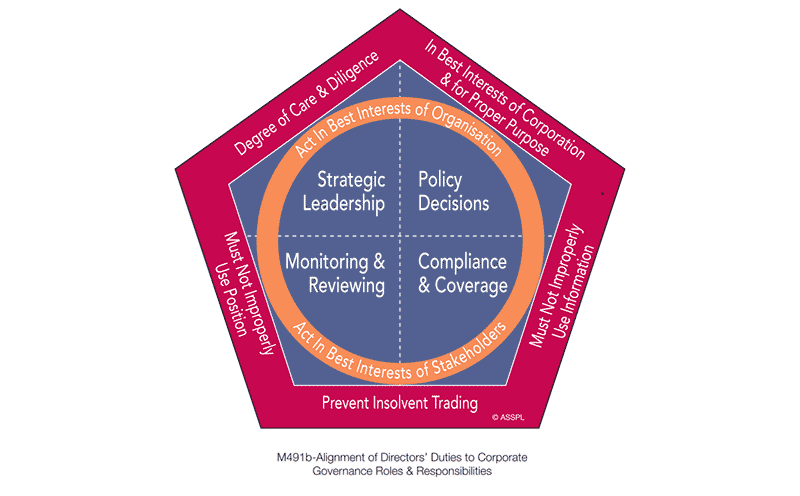governance
Directors Duties – Understanding Core Business
Published: October 11, 2021
Read Time: 5 minutes

Directors’ duties, as prescribed by law, set the scene for how a board constructs and operationalises its governance model and structure, roles and responsibilities, policies and procedures and undertakes its work and activities.
Beyond directors’ duties, a shared understanding between directors of the key concepts underlying their organisations (and their practical application) provides for more effective agreement on how their board and organisation will be configured, thereby enabling fundamental governance principles and practices to be enacted.
Directors’ Duties
Professional development for boards (or committees of management, councils or similar named groups of individuals) traditionally has a heavy focus on the duties prescribed by law. Knowledge and understanding of these director’s duties is critical. However, they provide little in the way of guidance to an individual about what the work of a director involves or how to effectively go about governing an organisation.
Directors’ duties can be understood as “the farm fence”, establishing minimum ethical standards and the boundaries within which directors must act, e.g.: acting in the best interests of the company first and foremost, acting in good faith and for a proper purpose, and acting with due skill, care and diligence etc.
Within the bounds of the farm fence there are a myriad of modus operandi that boards or individual directors adopt, and governance processes and practices that vary from board to board. Typically, these are centred around, in whole or in part, the:
- two governance roles
- acting in the best interests of the organisation; and
- acting in the best interests of stakeholders,
and
- four governance responsibilities
- strategic leadership;
- policy based decision making;
- monitoring and reviewing; and
- compliance and coverage.

Fulfilment of these governance roles and responsibilities are, in part, facilitated by the strengthening of an organisation’s mission critical elements, such as leadership, culture, strategy, structure, people, systems and the service/business model. Whether a board is ultimately able to influence these mission critical elements via the Chief Executive Officer or strengthen them where they fall within their governance roles and responsibilities, is heavily influenced by the skills, knowledge and experience of directors. A move towards ‘professional boards’ will not be news to those operating in the community business (not-for-profit) space. Boards can move beyond simple recruitment of the professional accountant, lawyer etc by understanding, documenting and implementing the concept of core business.
Core Business
Determining an organisation’s core business, its ‘raison d’être’ or reason for being is a fundamental element of contemporary governance. It should not be a description of the organisation’s current services. An example for an aged care organisation might be ‘enhancing the lifestyle and wellbeing of individuals with emerging or actual chronic health or complex health conditions’; rather than “delivering residential aged care services and building facilities”, which is in part a statement of the services delivered or activities undertaken.
Benefits & Value of a Documented Core Business
When properly drafted, a core business statement provides a board with criteria upon which to evaluate the continuation of existing or development of new services – the businesses that the organisation is in or not in. Flowing from this, another benefit of defining an organisation’s core business, is that it can be used to inform the skills, knowledge and experience required by the board to govern the organisation, whilst management delivers services and manages; that is, it allow boards to enact the principles of a skills-based board. The earlier example given of the core business of an aged care organisation might result in a (non-exhaustive list) of skills, knowledge and experience including:
- developing and/or improving organisational systems and ensuring appropriate robust reporting to directors against relevant key performance indicators, e.g. clinical and care governance (including the role of customer safety and quality systems), risk management, quality, human resources
- developing a customer-centric culture that allows true implementation of consumer directed care, and not just the meeting of customer expectations but exceeding them
- understanding of the current and emerging aged care and health care markets, their trends and drivers, including the role played by past, current and emerging State and Commonwealth government reform; and
- assuming the board of this organisation had recognised the need to move from a government funded welfare paradigm to a customer-driven competitive market paradigm, consistent with aged care reforms of the last decade and the government’s response to the aged care Royal Commission, significant experience in developing and implementing new business models, products or services that meet customer needs.
An organisation’s core business statement should be conceptually integrated with other fundamental organisational statements used by the community business such as:
- Vision – our light on the hill or sometimes expressed as a state where the organisation would not need to exist
- Mission – how we get up the hill or seek to achieve the vision
- Values – principles or standards that provide a behavioural compass, setting the expectation/benchmark for attitudes, behaviours and work practices of individuals, teams and the organisation; and
- Philosophy – seeks to capture the spirit, ethos or deeply held beliefs that reflect the organisation’s view of the world; if often incorporates or reflects the values.
Conclusion
Directors need to move beyond simply understanding their duties and develop shared understandings of the key concepts underlying organisations and their practical application. This will provide for more effective agreement on how the organisation will be configured, thereby enabling fundamental governance principles and practices to be enacted.
Core business is one such key concept, which when understood and documented, it can be implemented to provide an effective criteria by which the board can evaluate the continuation of existing services and development of new ones, and recruit directors with skills, knowledge and experience aligned and relevant to the nature of the organisation’s services (as captured in the core business statement).
First published in the Better Boards Conference magazine August 2021
Share this Article
Recommended Reading
Recommended Viewing
Author
-
Senior Consultant
Australian Strategic Services Pty Ltd
- About
-
A Senior Consultant with Australian Strategic Services, Aaron assists boards and individual directors to not only understand what their duties at law are but understand key concepts underlying organisations and how these enable fundamental governance principles and practices.
Found this article useful or informative?
Join 5,000+ not-for-profit & for-purpose directors receiving the latest insights on governance and leadership.
Receive a free e-book on improving your board decisions when you subscribe.
Unsubscribe anytime. We care about your privacy - read our Privacy Policy .










